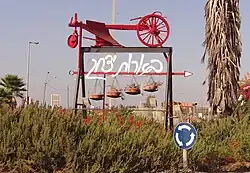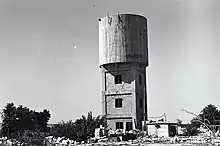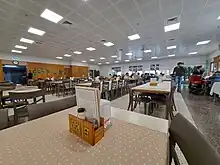Be'erot Yitzhak
Be'erot Yitzhak (Hebrew: בְּאֵרוֹת יִצְחָק, lit. 'Yitzhak Wells') is a religious kibbutz in central Israel. Located near Yehud, it falls under the jurisdiction of Hevel Modi'in Regional Council. In 2021 it had a population of 470.[1] Kibbutz Be'erot Yitzhak was originally located in the Negev, near Gaza. In 1952, after the kibbutz was destroyed and abandoned in the Battle of Be'erot Yitzhak, it was re-established in its current location south of Petah Tivka.[2]
Be'erot Yitzhak
בְּאֵרוֹת יִצְחָק | |
|---|---|
 | |
 Be'erot Yitzhak  Be'erot Yitzhak | |
| Coordinates: 32°2′34″N 34°54′32″E | |
| Country | |
| District | Central |
| Council | Hevel Modi'in |
| Affiliation | Religious Kibbutz Movement |
| Founded | 1943 (original location) 1952 (current location) |
| Founded by | Czechoslovak and German Jewish refugees |
| Population (2021)[1] | 470 |
| Website | www |


History
Ottoman era
During the 18th and 19th centuries, the area was part of the Nahiyeh (sub-district) of Lod, which encompassed the area of the present-day city of Modi'in-Maccabim-Re'ut in the south to the present-day city of El'ad in the north, and from the foothills in the east, through the Lod Valley to the outskirts of Jaffa in the west. This area was home to thousands of inhabitants in about 20 villages surrounded by tens of thousands of hectares of prime agricultural land.[3]
British Mandate era
The kibbutz was first established in 1943 near Gaza on the site of what is today Kibbutz Alumim and Kibbutz Nahal Oz. The settlers were immigrants from Czechoslovakia and Germany, members of the HaPoel HaMizrachi movement. The name is a reference to the patriarch Isaac's search for water in this area.[4] In 1947, it had a population of 150.[4] During the 1948 Arab–Israeli War the kibbutz took serious losses and was badly damaged by the Egyptian Army in the Battle of Be'erot Yitzhak, which included aerial bombardment. According to a report by the Jewish National Fund, the Egyptians were driven out but suffered hundreds of losses.[4]
State of Israel
In 1949 an attempt was made to re-establish the collective on the remains of Wilhema. The kibbutz moved to its present site in central Israel in 1952.
References
- "Regional Statistics". Israel Central Bureau of Statistics. Retrieved 22 February 2023.
- Fallen Heros: Lemberger, Rina
- Marom, Roy (2022). "Lydda Sub-District: Lydda and its countryside during the Ottoman period". Diospolis - City of God: Journal of the History, Archaeology and Heritage of Lod. 8: 103–136.
- Jewish National Fund (1949). Jewish Villages in Israel. Jerusalem: Hamadpis Liphshitz Press. p. 15.